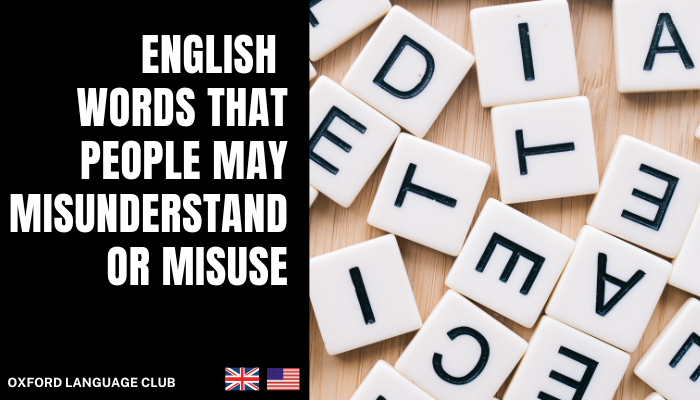Great site to keep my english skills updated for work and travel. I am really enjoying the lessons!
Maria C
 Argentina
Argentina


English is a complex language with many words that have multiple meanings. However, this complexity can sometimes lead to misunderstandings or misuse of certain words. Here are some English words that people may commonly misunderstand or misuse.
Decimate
The word "decimate" comes from the Latin word "decimare" which means "to take a tenth." The original meaning of the word was to kill one in every ten soldiers as a punishment for mutiny or other serious offenses. However, today "decimate" is often used to mean "to destroy a large portion of something." This incorrect usage is so common that it is now accepted as a secondary meaning in many dictionaries. For example, "The hurricane decimated the city" suggests that a large portion of the city was destroyed, whereas the original meaning of the word suggests that one in ten people were killed.
Peruse
The word "peruse" means to read thoroughly or carefully, but many people use it to mean to skim or glance over quickly. This incorrect usage is so common that it has become accepted as a secondary meaning in many dictionaries. For example, "I perused the report quickly" suggests that the person read the report thoroughly, whereas the actual meaning of the word suggests that they read it carefully and in detail.
Enormity
The word "enormity" originally meant "a great crime or outrage," but today it is often used to mean "large size." This incorrect usage is so common that it has become accepted as a secondary meaning in many dictionaries. For example, "The enormity of the task ahead of us" suggests that the task is large in size, when in fact the word suggests that it is a great challenge or difficulty.
Literally
The word "literally" means actually or in a literal sense. However, many people use it to mean "figuratively" or "metaphorically," which is the opposite of its actual meaning. For example, "I was so hungry, I literally ate a horse" is an incorrect use of the word "literally," as it suggests that the speaker actually ate a horse, when in fact they did not.
Unique
The word "unique" means one-of-a-kind or singular, but many people use it to mean simply unusual or rare. For example, "That's a really unique outfit" is an incorrect use of the word "unique," as it suggests that the outfit is one-of-a-kind when in fact it may be unusual but not unique.
In summary, English is a language with many words that can be easily misunderstood or misused. By understanding the correct meanings and uses of these words, you can communicate more effectively and avoid common mistakes.
April, 2023
Posted by Darat Ajyal Sharurah